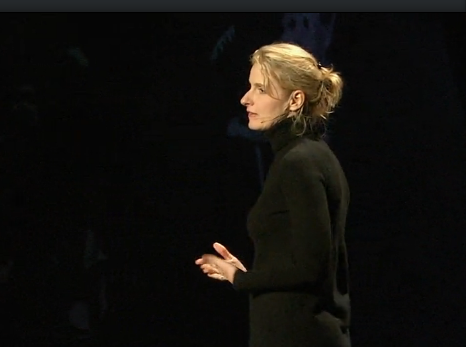And when this happened, back then, people knew it for what it was, you know, they called it by its name.
當(dāng)時的人們,清楚地知道這是什么,他們能叫出它的名字。
They would put their hands together and they would start to chant, "Allah, Allah, Allah, God, God, God." That's God, you know.
他們會拍起手來,開始吟唱:阿拉,阿拉,阿拉,神啊,神啊,神啊。人人都知道:那是神跡顯現(xiàn)。
Curious historical footnote: when the Moors invaded southern Spain,
有趣的野史是,當(dāng)摩爾帝國入侵南西班牙時,他們帶去了這一習(xí)俗,
they took this custom with them and the pronunciation changed over the centuries from "Allah, Allah, Allah," to "Olé, olé, olé," which you still hear in bullfights and in flamenco dances.
于是幾世紀(jì)來,頌詞的發(fā)音漸漸改變,從“阿拉,阿拉”變成“歐嘞,歐嘞”,如今你仍能在斗牛比賽和弗拉明戈舞中聽到這一喝彩聲。
In Spain, when a performer has done something impossible and magic,
在西班牙,當(dāng)一個表演者完成了某種不可思議的神奇之舉時,
"Allah, olé, olé, Allah, magnificent, bravo," incomprehensible, there it is -- a glimpse of God. Which is great, because we need that.
人們就會喝彩:“阿拉,歐嘞,歐嘞,阿拉,真?zhèn)ゴ螅袅耍豢伤甲h”,那就是神跡顯現(xiàn),這種方式很好,因為這正是我們需要的。
But, the tricky bit comes the next morning, for the dancer himself, when he wakes up and discovers that it's Tuesday at 11 a.m., and he's no longer a glimpse of God.
對藝術(shù)家來說,最棘手的是第二天早上,舞者悠悠轉(zhuǎn)醒,發(fā)現(xiàn)已經(jīng)是周二上午11點了,他不再是神跡的顯現(xiàn)。
He's just an aging mortal with really bad knees, and maybe he's never going to ascend to that height again.
而只是那個腰腿不好,終將老去的凡人,而且,他或許再也無法達(dá)到昨晚那樣的高度了。
And maybe nobody will ever chant God's name again as he spins, and what is he then to do with the rest of his life?
也許再也不會有人在他跳舞時喝彩神跡顯現(xiàn),他該如何自處呢?
This is hard. This is one of the most painful reconciliations to make in a creative life.
這是個很棘手的問題,也是創(chuàng)作生涯中最痛苦的自我認(rèn)知之一。
But maybe it doesn't have to be quite so full of anguish if you never happened to believe,
但也許,我們原本無需如此痛苦,如果你本來就從不曾認(rèn)為,
in the first place, that the most extraordinary aspects of your being came from you.
那無與倫比的藝術(shù)作品完全來源于你。
But maybe if you just believed that they were on loan to you from some unimaginable source for some exquisite portion of your life to be passed along when you're finished, with somebody else.
如果你認(rèn)為它們是某種神奇的存在,只是暫時借你一用,給你帶來精美絕倫的作品,在你完成作品后,繼續(xù)傳遞給其他人,
And, you know, if we think about it this way, it starts to change everything.
如果我們這樣看待這一問題,一切就都改變了。

This is how I've started to think, and this is certainly how I've been thinking in the last few months
在過去的幾個月中,我開始以這種方式看待這一問題,
as I've been working on the book that will soon be published, as the dangerously, frighteningly over-anticipated follow up to my freakish success.
同時從事著我下一本書的寫作那本危險的,駭人的,被過度預(yù)期的,繼我的暢銷大作之后的作品。
And what I have to sort of keep telling myself when I get really psyched out about that is don't be afraid.
而我需要做的,就是不斷告訴自己,尤其是在我憂郁焦躁的時候:
Don't be daunted. Just do your job. Continue to show up for your piece of it, whatever that might be.
“不要害怕,不要氣餒,只需做好你的那部分工作”,堅守在你的崗位上,無論你的崗位是什么:
If your job is to dance, do your dance. If the divine, cockeyed genius assigned to your case decides to let some sort of wonderment be glimpsed,
如果你是舞者,那就跳舞,如果那個屬于你的,神圣卻又邪門的精靈決定通過你讓神跡顯現(xiàn),
for just one moment through your efforts, then "Olé!"
哪怕只是短短一瞬。那么,讓我們喝彩:“歐嘞”!
And if not, do your dance anyhow. And "Olé!" to you, nonetheless. I believe this and I feel that we must teach it.
如果沒有,那就請繼續(xù)跳舞,堅守你的崗位,我依然為你喝彩:歐嘞!我堅信我們必須傳授這一理念。
"Olé!" to you, nonetheless, just for having the sheer human love and stubbornness to keep showing up. Thank you.
只要你出于熱愛與執(zhí)著,堅守崗位,那你就值得喝彩:“歐嘞”!謝謝。



